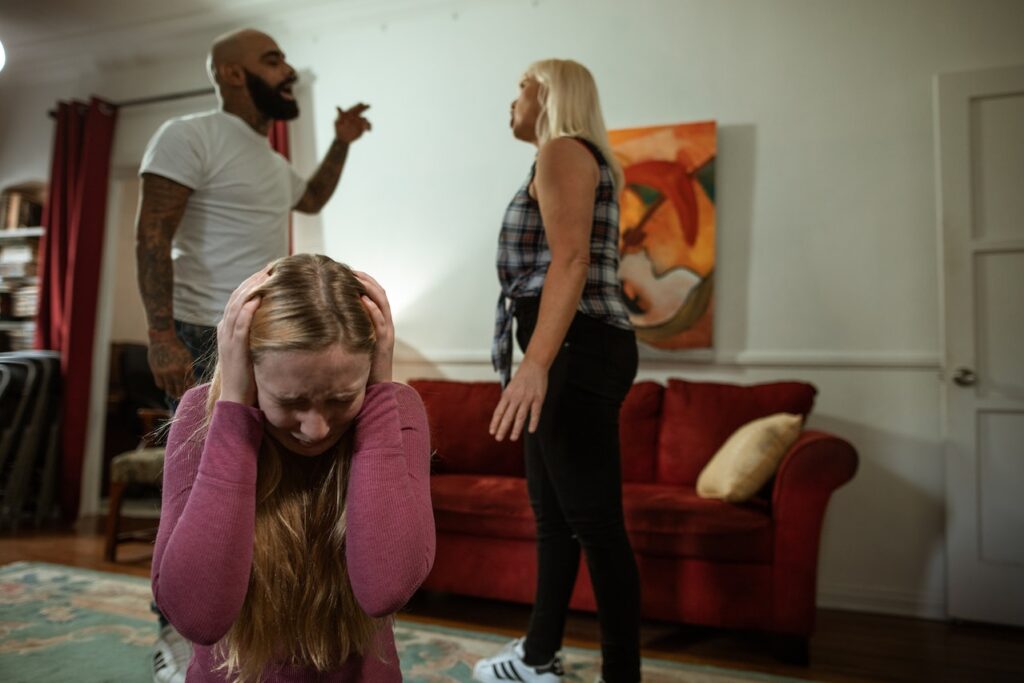Arguing with your partner is inevitable. No matter how much you try to avoid arguing in front of kids, there will be moments when things go out of control.
Studies have found that babies as small as six months of age can sense a stressful environment. If the parents are yelling or shouting in the presence of the baby it makes their cortisol levels shoot up.
You would be surprised to know that there have been studies to prove that a mother’s stress hormones have the capability to cross into the placenta and be passed on to their babies.
Long-term Effects
In the famous American psychologist D.Phil.’s words, “Fighting in front of kids is nothing short of abuse.”.
Young kids or babies might not understand the context or the words said, but the facial tone, the expressions, or the volume can have an adverse impact on their responses. Crying or having a meltdown might be the instantaneous or temporary reaction to parents arguing in front of kids. But there are certain long-term effects, that can haunt them much later in life too.
- Difficulty with concentration
- Depression
- Anxiety
- Modeling the same behavior in future
- Social challenges
Please don’t start to panic if you just had your first fight in front of the child and are now diving into guilt.
Long-term repercussions can depend on several factors:
- How severe was the outburst when you were arguing in front of the kids
- How frequently do you fight in front of kids
- How is your kid’s temperament
- How do they perceive tension among parents
While you are arguing in front of kids
Though our emotions are running high at the moment, we shouldn’t forget that we are adults. If fighting seems inevitable, at least we can continue, bearing some ground rules in our heads.
- Keep your volume/tone low. If you are arguing in front of your kids, try to keep the tone and volume low. Shouting and yelling can scare the child. Worse, it may teach them that it is okay to raise your voice while arguing with someone.
- Never ever drag the kids in your fight. Pulling them among your arguments or asking them to take sides in an extremely damaging way to deal with the situation. Another flipside could be them thinking that it is their fault that their parents are arguing, which can hamper their emotions.
- Mind your words. Always restrain from using foul language, or demeaning or insulting words, especially if your kids are old enough to understand. This- mostly happens when arguments start to get ugly. Take a pause and watch your kid’s face. It is traumatizing for them to see their caregivers in such a demeanor. Bite your tongue and then move on if you can’t stop.

What should you do after the fight?
A healthy family dynamic frames a healthy environment at home. This helps with the emotional well-being of not just the children but the adults as well.
Having said that it is also true that disagreements or arguing with your partner is only natural. So, what should you do if you have just fought in front of your kids?
1. Immediate Actions
Psychologists have found out that even if a child witnesses an intense argument between parents, he can be consoled if the parents immediately acknowledge it and comfort him. Children seek safety and security from parents, and if that is reassured in that moment the child can get back to feel being safe.
2. But is that enough?
For little older kids who heard the ‘nasty words’ and the ‘name callings’ and witnessed an ugly fight, just hugging wouldn’t do much damage control. According to many psychologists and therapists, it is very important for children to also see parents making up after a fight. That gives them a learning that arguments are part of life but so is to patch up later. It gives them a sense of security that things are still the same and nothing has gone downhill because of one fight.
3. Talk to your child
When you talk to them later, explain to them that it should not have happened but if it still happened it does not anyhow mean that there is no love among parents. Refrain from blaming yourself or the other parent for arguing in front of kids. Also, there is no need to explain to them the whole scenario (cause and details). Just letting them know that you fought but that you still love their other parent will comfort them.

Don’t take guilt trips every time your child watches you have fights. As stated in Care.com by Dana Dorfman, psychotherapist and co-host of the podcast ‘2 Moms on the Couch’, “It’s important for children to be exposed to loving people who disagree since it’s an inevitable part of any relationship.” But the steps you take after or during such an episode can make a huge difference.

So valid !! Well put ! Would love to read more on such stuff
Glad you liked. 🙂
Pingback: 4 Key Co-parenting Tips after Separation - The Parenting Blog